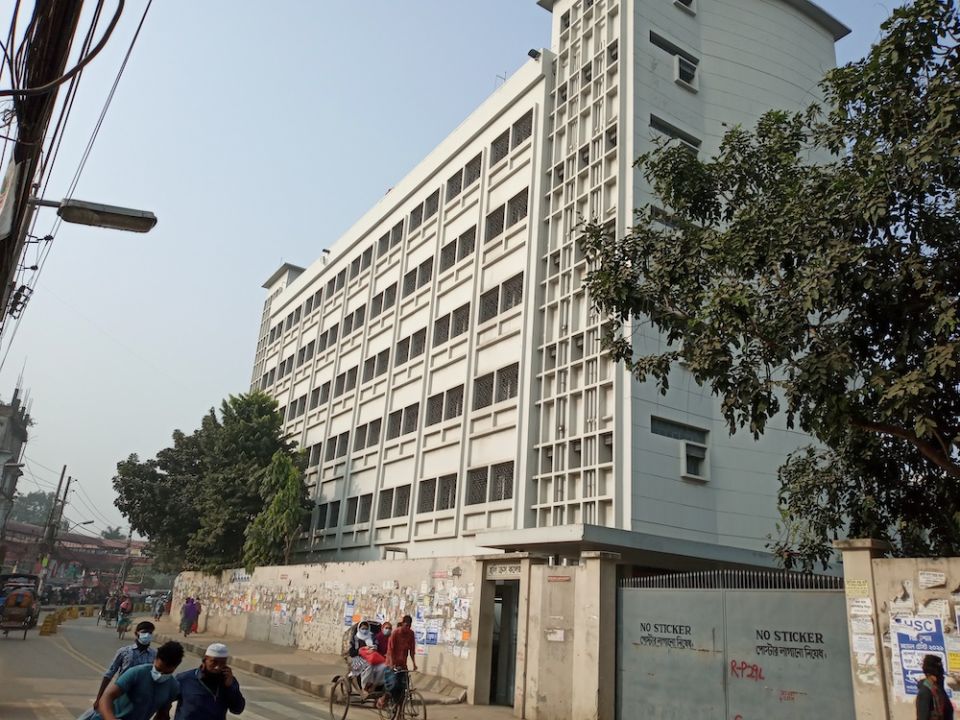Holy Cross students c.JPG
Dhaka, Bangladesh — The coronavirus pandemic has meant worsening trouble for nuns and their students across Bangladesh.
"It is difficult to collect tuition fees from the students. Many of the parents and guardians lost jobs and businesses, and the families are going through financial crisis," Holy Cross Sr. Shikha Laetitia Gomes told Global Sisters Report. Gomes is the principal of Holy Cross College in Dhaka, one of the top colleges in the country for female students. "We got tuition fees from 70% of the students. The rest of the students couldn't give it to us."
Although Christians make up less than 1% of the population of this Muslim-majority country, the Catholic Church runs approximately 1,000 schools, 17 colleges and one university. Of those, nuns run around 100 schools, including some colleges. Approximately 80% of the students at these institutions are not Christian.
Advertisement
Advertisement
As of Dec. 17, Bangladesh had almost 500,000 cases of COVID-19, with 7,129 deaths. On Nov. 12, the government announced a school holiday through Dec. 19 that could be extended for the next wave of pandemic, which is expected through January as the weather gets colder.
Gomes said because of the pandemic, "some students also lost their near and dear ones, especially earning members. Some of the students are going through mental stresses, depression, loneliness and frustration."
She said students also face some academic challenges.
"Our classes, exams and co-curricular activities of the college have been hampered," she said.
"Being ordered by the government to conduct the online admission process ... where the students were scattered all over the country was a real challenge."
Sr. Mabel Costa of the Sisters of Our Lady of the Missions, who is principal of St. Euphrasie's Girls' School and College in Hashnabad in Dhaka, told GSR that only about half of their students paid their tuition fees for the 2020-2021 school year.
"We are worried about running our school and college," she said. "Half of the students couldn't pay their tuition fee due to a decline in their parents' income. Although we are providing class online, many students can't attend online class because many of them don't get internet connection or can't afford the cost of internet."
She said many students are needy, and most of the students' parents have been affected financially by the pandemic. The teachers have started to visit the homes of the students so they can collect tuition
Holy Cross College 2 c.jpg

Meanwhile, only about 40% of the students at the Associates of Mary, Queen of Apostles' Mary's Girls' School and College in Kaligonj of Gazipur, near Dhaka, have been able to pay tuition fees, said Sister Mary Christina.
"We have taken out a loan of 1 million taka [approximately $11,800]," she told GSR. "We are paying the salaries of our teachers and staff. We have other administration costs. We are very worried in this situation. We don't know how it will be normal, when we will earn money and can properly pay salaries."
Sister Mary Christina, whose congregation runs 35 schools in the country, said their college, like other communities' schools, have started online classes during the pandemic.
However, "broadband internet connection is not available in the villages," she said. "Mobile companies provide internet service, but their service is so costly that most of the students cannot afford the cost. The cost of the internet is more than tuition fees."
The country's Directorate of Secondary and Higher Education on Nov. 18 issued a directive saying that private educational institutes can only charge tuition fees. They will not be allowed to take other kinds of fees. The notification came at a time when students of private schools and colleges and their parents staged demonstrations in different parts of the country, protesting schools' collection of various fees from the students.
"Mobile companies provide internet service, but their service is so costly that most of the students cannot afford the cost. The cost of the internet is more than tuition fees."
—Sister Mary Christina
St. Euphrasie's Girls' School, College cc.JPG
"If we can't take assignment, tiffin [lunch], readmission, library, and science laboratory and development fees from students, we don't know how we can run our school and college as per government guideline," Sister Mary Christina said, expressing frustration. "Our income will decline more."
The nuns who talked to GSR said many of their students will not return to school after the pandemic ends. Their parents will arrange a marriage for their daughters because of a decline or loss of income. Bangladesh has the highest rate of marriage of girls under the age of 15, according to UNICEF.
Even though school is still in session virtually, some educators are struggling financially. Catholic Sumi Gomes, who usually works in one of the schools run by the Associates of Mary, Queen of the Apostles, teaches from home, but the extra money she used to make tutoring students has dried up.
"I am struggling to survive in Dhaka," she said. "If the COVID-19 situation does not become normal, I might move to the village area of Natore."
She said many Christian teachers who work in non-missionary schools or colleges have moved back to villages after their salary stopped coming or they lost a job.
However, Holy Cross College's Gomes said the pandemic has brought some good things. She said in this busy era, family members got a break.
"Earlier, people were busy with their work, but because of the coronavirus, people gave more time to their family members, and environment pollution has declined," she said. "I saw many people are taking care of those are suffering from the COVID-19 pandemic. It is also time to show humanity, and I saw it."
Shikha Laetitia Gomes 2 c.JPG
[Sumon Corraya is a Catholic journalist based in Dhaka, Bangladesh. He covers issues affecting the Christian community in Bangladesh.]
Like what you're reading? Sign up for GSR e-newsletters!

